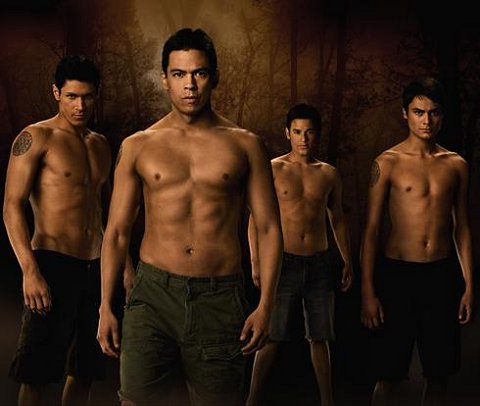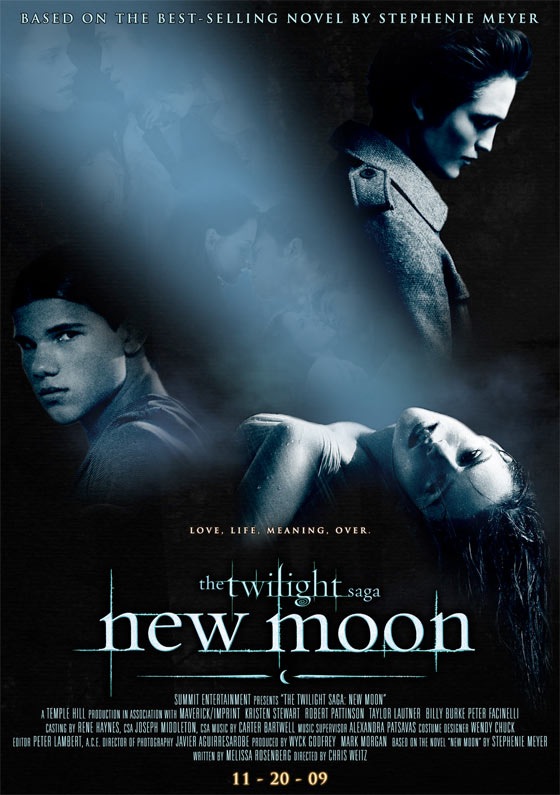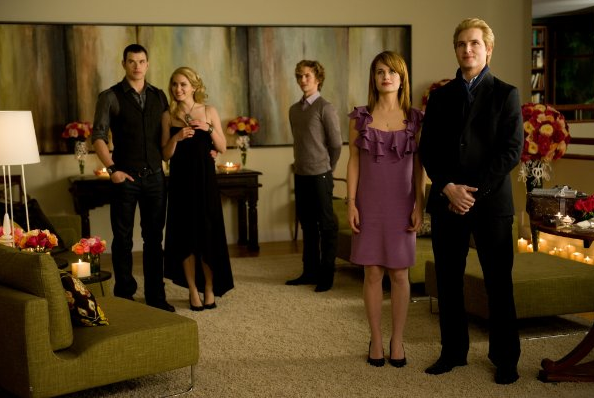
Image Credit: Empire Movies
There has been some controversy—though less than might be
expected—about the racial politics of the new Twilight movie, New Moon. I went to see the film the other night
and while I was prepared for smoldering gazes, repressed
embraces, and some retrograde gender relations, I was not prepared for its
representations of race. While several critics have protested the casting of predominately non-Native American
actors in Native American roles, far less comment has been made about the
portrayal of Native American characters as bare-chested pack animals that morph
into wolves when they become angry. The main character in this storyline is Jacob Black who falls in
love with Bella Swan and then comes down with puberty-induced werewolfism. He and the other wolves are all members
of the Quileute tribe, which long ago signed a territorial treaty with the vampires. Sound
familiar?

Image Credit: www.newmoonmovie.org
The storyline reminds me of a 19th century Irish
genre called the “national tale” in which national identity is allegorized as
the choice between an English and an Irish mate. The heroine or hero’s choice becomes an allegory for
national identity: should the nation embrace its indigenous roots or reach
outwards towards Englishness? In
New Moon, Bella is seemingly rejected by her urbane vampire beau Edward Cullen and becomes increasingly attracted to Jacob.
While the story is simple, or simply formulaic, enough, I wondered how
allegorically we are meant to read Bella’s choice between the vampiric
cosmopolitans and the animalized locals? To further complicate and more firmly allegorize this love plot, the final scenes of the novel take Bella to Europe, which
appears to be the origin point of vampire culture and home to the Volturi
vampires. Compared to the
blood-sucking European monsters, the American Cullen vampires seem models of restraint and compassion. Wedged between the Volturi
and the Quileute, Edward and Bella seem to articulate a particularly American
version of the national tale.

Image Credit: Screen Shot IMDB
In Alisa Valdes-Rodriguez’s blog post, “The Politics of
Wizards and Vampires,” she argues that Stephanie Myers’ Twilight books
represent a particularly right-wing fantasy world. While Valdes-Rodriguez clearly articulates the religious
components of conservativism in the novel, I would add that the story also
demonstrates conservative values in its representation of national
identity. As an American national
tale that rejects both European and Native-American identities, the
Edward-Bella romance is also a romance of American exceptionalism.
Comments
Agreed...and looking to complicate...
Like Rachel, I'm a shameless fan of the books (and movies) when I need some escapism, although I so recognize their major, major problems. One of the things that makes your post so interesting and great to me is that it goes beyond the standard "Bella is a totally anti-feminist character" (which she arguably is until the last book or so, and even for the most part there) argument that we usually hear about this series and takes up one of its even more insidious aspects. I absolutely agree with your argument here, and it also left me wondering about how it holds up in the face of actual native american myth, legend, and folklore, from which Myers borrows pretty heavily, I understand. (And again, that in itself is problematic, seemingly non-self-reflexive white woman that she is.) But if we got beyond the redface going on here, and imagined that we lived in a world where casting directors were smart and conscious about issues around race and representation, where does that leave us in terms of legend? I wonder what moves could have been made to comment on the lore being manipulated here in a way that might have avoided orientalism? Is it always questionable at best and racist at worst to borrow from minority cultural material to create popular fiction/performance? Is it the manipulation of it for majoritarian ends--for which you make a compelling case--the only problem with it? In other words, under what circumstances, if any, would this kind of appropriation and representation be ok? I now can't stop thinking about all of these questions, and I'm glad you raised the points you did here. Fascinating post!
Interesting Images
As you know, Emily, I am a huge fan of the Twilight series (though I will readily admit the many problematics surrounding it), so I enjoyed reading your post. I'm also interested in the poster image you've presented here, where the white vampire Edward dominates the top of the image in profile, Jacob peering over his shoulder on the left (the sinister side!), and Bella is stretched out, literally weaker and more feeble than the men. (Is this a fan-created poster? I haven't seen it, only this one.) I wonder how the posters might inscribe these dynamics you've described, just as Alice Cullen's penchant for shopping makes the Cullens not only good Europeans, but good capitalist consumers as well.